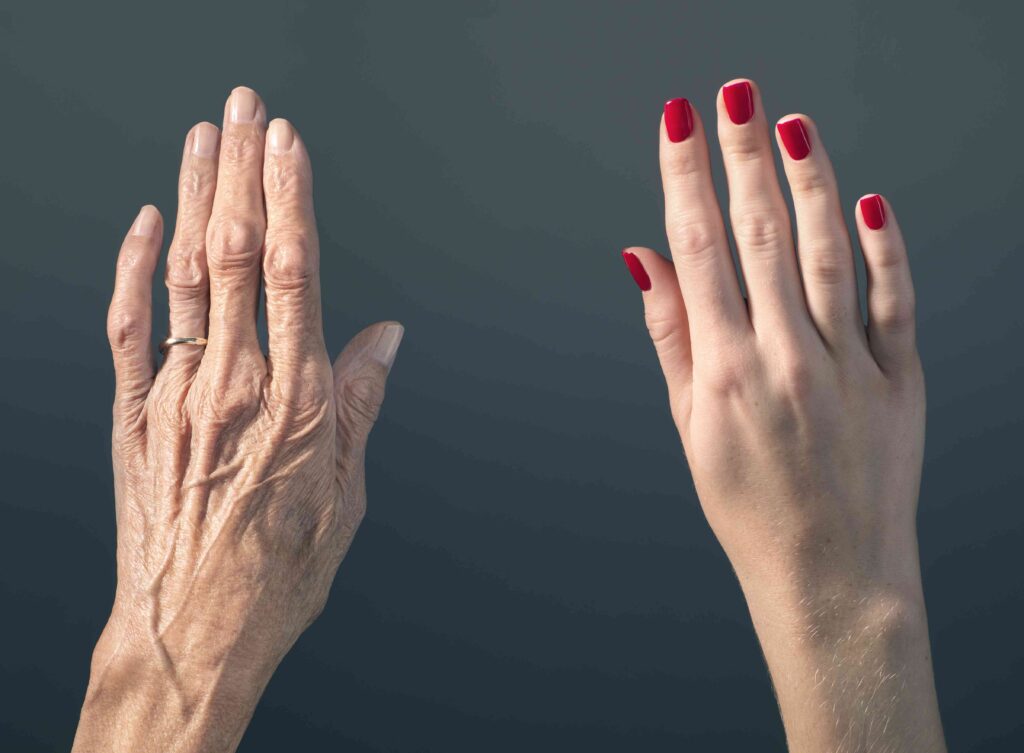:max_bytes(150000):strip_icc():format(jpeg)/Health-GettyImages-512160707-386595a8bd444849bcabd87bfbd221a7.jpg)
Middle age: A time period marked by more gray hairs, some possible weight gain, potentially a midlife crisis, and—according to new research—two dramatic changes in humans on a molecular level.
The claim comes from a study published in August in the journal Nature Aging, challenging the idea that people age in a gradual fashion. Instead, the research shows many of the molecules and microorganisms in our bodies significantly increase or decrease around ages 44 and 60—ultimately creating aging peaks.
“Most people think of aging as occurring gradually, constantly, and linearly,” senior study author Michael Snyder, PhD, a professor of genetics and director of the Center for Genomics and Personalized Medicine at Stanford University, told Health.
But “we’re not just changing gradually over time; there are some really dramatic changes,” Snyder said in a news release. “It turns out the mid-40s is a time of dramatic change, as is the early 60s. And that’s true no matter what class of molecules you look at.”
And these molecular changes aren’t insignificant to our health—they were seen in molecules related to cardiovascular disease, skin and muscle health, immune regulation, and kidney function, among others.
Here’s what you need to know about the latest findings and what these aging peaks could mean for your overall health.
As we age, our risk of age-related diseases—cancer, Alzheimer’s disease, cardiovascular disease—increases. But this doesn’t always happen gradually, according to researchers, who noted that the risk of Alzheimer’s disease and cardiovascular disease, for example, rise sharply in older age.
To look into this—specifically by analyzing molecular and microbial shifts in the human body—researchers from Stanford University and Nanyang Technological University in Singapore used data from 108 participants between the ages of 25 and 75.
Those participants donated blood and other biological samples (stool samples, oral and nasal swabs) every few months over the course of several years. From those samples, researchers were able to track age-related changes in more than 135,000 different molecules and microbes in the participants’ bodies.
The analysis showed that the majority of molecules and microbes underwent major changes in their abundance (increasing or decreasing) during two time periods: when people were in their mid-40s and early 60s.
The massive shifts in the bodies of 60-year-olds weren’t entirely surprising to researchers—Snyder noted that many age-related diseases and phenomena increase at that point in life. But the changes in 40-year-olds—particularly in men and women alike—were surprising.
“This suggests that while menopause or perimenopause may contribute to the changes observed in women in their mid-40s, there are likely other, more significant factors influencing these changes in both men and women. Identifying and studying these factors should be a priority for future research,” first study author Xiaotao Shen, PhD, a former Stanford Medicine postdoctoral scholar, said in the news release.
Though it’s too early to know how these molecular shifts impact aging, researchers were able to pin down which molecules were related to which bodily functions, systems, or diseases.
The molecules that showed extreme changes in a person’s 40s, for example, were related to alcohol, caffeine, and lipid metabolism, as well as cardiovascular disease and skin and muscle health.
Meanwhile, molecular changes in a person’s 60s were related to carbohydrate and caffeine metabolism, immune regulation, kidney function, cardiovascular disease, and skin and muscle health.
According to experts, these changes might show up as a reduced ability to metabolize caffeine and alcohol, suggesting that it may be wise to cut back on those substances. People in their 40s and 60s may also see a greater risk of developing cardiovascular disease, and people in their 60s may benefit from supporting their immune systems.
Although aging is unavoidable, experts say there are ways to “manage or slow some of the changes associated with menopause and aging,” Ronald DePinho, MD, a professor of cancer biology at the University of Texas MD Anderson Cancer Center, told Health.
The easiest way to do that is through lifestyle changes, said DePinho—that means staying active, eating and sleeping well, managing stress, and avoiding smoking and excessive alcohol.













